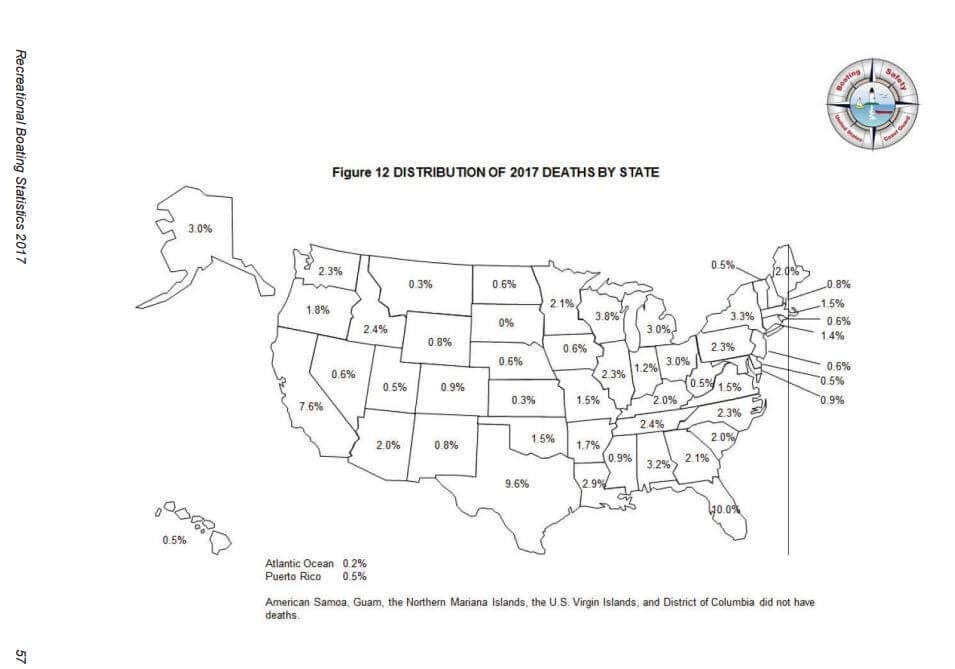It seems that the pleasure boat maritime industry has become safer!
Fatal boat accidents nationwide have decreased according to the 2017 Recreational Boating Statistics, recently released by the U.S. Coast Guard. According to the report, in 2017, the nation witnessed 4,291 pleasure boat accidents that involved 658 deaths, 2,629 injuries and around $46 million dollars of property damage. In total, the nation’s fatality rate involving boat accidents was 5.5 deaths per 100,000 registered recreational vessels. Compared to the boat fatality rate of 2016, there was a 6.8% drop.
In 2017, as opposed to 2016, the number of accidents decreased 3.9%, the number of deaths decreased 6.1%, and the number of injuries decreased 9.4%.
What Was the Cause of Death for the Majority of Boat Accidents?
In the cases where cause of death was known, 76% of fatal boat accident victims died of drowning. Of those drowning victims where life jacket usage was taken into account, 84.5% were not wearing a life jacket. Alcohol was the leading factor in terms of contributory causes in fatal boat accidents. In cases where the the primary cause was found, alcohol was the leading contributing factor in pleasure boat accident fatalities.
What Were the Primary Contributing Factors for Boating Accidents?
Reasons that ranked highest included (1) Operator inattention, (2) improper lookout, (3) operator inexperience, (4) machinery failure, and (5) alcohol use. Others include excessive speed, navigation rules violation, weather, hazardous waters, and force of wave/wake.
It is critical as a boat operator to keep these contributing factors in mind. Failing to adhere to these reasons will put you in serious liability under the maritime law, as you are in violation of a Coast Guard regulation. Some of these pieces of advice include the following: (1) Never drink and drive while operating a pleasure boat; (2) Keep carbon monoxide in mind; (3) Make sure you take a boat safety course; (4) Have a free vessel safety check performed on your pleasure boat; (5) Always wear life jackets while on the watercraft; (6) While operating, pay attention in all directions; (7) Make sure to know the nautical rules.
What were the Boat Accident Fatalities by State?
Distributing fatal boat accidents by state, Florida comes first with 10% and Texas comes to a close second with 9.6% of the country’s fatal boat accidents. Michigan fatal boat accidents in 2017 comprised 3% of the total, and Illinois boat accidents came out to 2.3%.

Find the 2017 Recreational Boating Statistics at the USCG Website.
What Type of Law is Applicable in my Boating Accident?
A common misconception is that the maritime law only protects workers and seamen. In truth, the General Maritime Law protects any victim on a navigable waterway in the United States. Whether you were working, traveling, or simply relaxing and were injured in a pleasure boat accident, you may be able to recover compensation for your injuries. Your personal injury lawsuit for your boat accident can be filed in either your state or federal court; our attorneys will file it in the place most advantageous for you.
It is important to find yourself a tough and experienced maritime lawyer to represent your interests zealously and get every dime that you deserve in a pleasure boat accident. A maritime lawyer will be able to navigate through the complexities of the General Maritime Law and access the risks of litigating your case, based on years of experience in the maritime legal context. One of the many complexities involved in your maritime case involves the Limitation of Liability Statute, which can limit damages of the lawsuit, unless one can prove that the owner had knowledge of the negligent condition or conduct.
If you have been injured while on a pleasure boat anywhere in the continental U.S., contact the maritime lawyers of O’Bryan Law immediately for a case consultation. We represent victims of pleasure boat injuries throughout the United States. You may be able to seek compensation for your hardships under the General Maritime Law.



